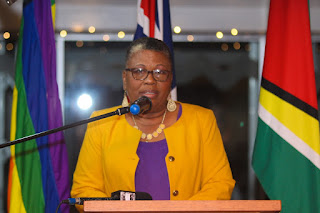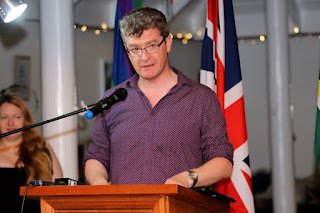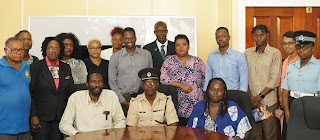Medellin,
Colombia
July
2019
SUMMARY
The Coalition of Lesbians, Gays, Bisexuals, Trans, Transsexuals, Travestis
and Intersex (LGBTTTI) of Latin America and the Caribbean that work within the
framework of the Organization of American States (OAS) was present at the 49th
regular session of the General Assembly, which took place in Medellín,
Colombia, on June 27-28, 2019. As in previous years, we also participated in
the Dialogue with Heads of Delegation and the OAS Secretary General, among
other actors, through two coalitions, one coalition of LGBTI people and another
- established for the first time this year - of sex workers.
As a Coalition, we welcome the important advances in the field of human
rights, sexual orientation, gender identity, gender expression and sex
characteristics in this General Assembly, including the adoption of the 11th
resolution on the human rights of LGBTI people - with a more inclusive language
than in previous years-, the re-election of Commissioners Arosemena and
Macaulay and the election of Julissa Mantilla, despite the attempts of
anti-rights groups to delegitimize their candidacies. Likewise, we reject the
attempt to close spaces to civil society, led by the Colombian government in
the context of the OAS General Assembly and call on the OAS to avoid these
situations in the future.
PROGRESS AND CHALLENGES IN THE REGION
We emphasize that, despite considerable progress in terms of policies,
laws and judicial recognition in most countries of the Americas, there are many
challenges that restrict the full enjoyment and exercise of our rights. We
continue to see high levels of violence and discrimination against LGBTI
people, or those perceived as such, in the Americas. In this regard, we express
our concern about crimes based on prejudice because of sexual orientation, gender
identity and expression, without the State maintaining official records on such
crimes, which makes prevention and investigation difficult. In particular, the
Coalition categorically condemns the wave of murders and violence directed at
LGBT people in recent weeks in Honduras, and encourages the authorities to take
all effective measures to respect and guarantee the life and personal security
of LGBT people and their human rights defenders.
Likewise, there are still state laws, policies and practices that
directly criminalize us, violating our human rights. However, in 2016 and 2018
we noticed considerable progress in terms of discrimination based on the law in
the English-speaking Caribbean. In addition to the recent decriminalization of
consensual sexual relations between adults of the same sex in Belize and
Trinidad and Tobago, the Caribbean Court of Justice issued a ruling at the end
of 2018 in McEwan and others, ruling that the criminal provision
prohibiting the use of garments associated with another gender in Guyana was
unconstitutional. Likewise, there have been important advances in Latin
American countries, among which we highlight the following: the adoption of the
Integral Gender Identity Law (Ley Integral Trans) in Uruguay; the
Gender Identity Law in Chile; the implementation of the trans labor quota in several
Argentinean cities; the approval of same-sex marriage. as well as the judicial
recognition of co-maternity in the Satya case and the recognition of the right
to identity of a trans girl in Ecuador; and the adoption of the LGBT National Public
Policy and the inclusion of a gender perspective in the Peace Agreement in Colombia,
among others.
Regarding autonomous sex work, although it is not explicitly prohibited
in most countries in the Americas, there are regulations and laws that criminalize
the different acts related to sex work. This, coupled with the absence of clear
regulations that recognize sex work as work, creates the conditions that foster
institutional violence -including sexual and physical violence, extortion and
illegal detentions- and reinforce obstacles that prevent sex workers access to
basic health and justice services. We note with concern that, although the
IACHR held a first hearing on human rights violations of female sex workers in
March 2017, the Commission has not granted further hearings on this subject,
despite numerous requests in this regard.
We also see with great concern the emergence of bills or laws that seek
to criminalize transmission, non-disclosure and exposure to HIV, or the misuse
of criminal law to criminalize people living with HIV. We commend the
Constitutional Court of Colombia for its June 5, 2019 judgement which declared
unconstitutional the criminal provision that imposed imprisonment to a person
living with HIV or Hepatitis B who engaged in activities that could infect
another person.
THE DIALOGUE WITH HEADS OF STATE, THE
SECRETARY GENERAL, THE DEPUTY SECRETARY GENERAL, AND CIVIL SOCIETY
REPRESENTATIVES
During the Dialogue we saw a growing number of allies who incorporated in
their declarations a message of equality for all people and of acceptance towards
sexual and gender diversity, including a recently established Coalition of Sex
Workers. This Coalition is made up of organizations associated with the Network
of Sex Workers of Latin America and the Caribbean (Red de Trabajadoras
Sexuales de América Latina y el Caribe - RedTraSex), which are members of
our LGBTTTI Coalition since 2018.
We continue to see that conservative and anti-rights groups promote
messages that violate human dignity and attempt to undermine the human rights
of LGBTI people in the Americas. Many of these messages include a narrative
that ignores the legitimacy of the organs of the Inter-American Human Rights
System to monitor the compliance of States with the most basic international
human rights obligations, which are not up for debate, such as the obligation
to guarantee rights. equality and non-discrimination.
This year, in the context of the Dialogue we noticed how some of the anti-rights
coalitions misrepresented concepts such as corruption to openly attack members
of the Inter-American Commission on Human Rights (IACHR), using precepts such
as “gender ideology.” In this regard, we emphasize that experts and
international human rights organizations have criticized the use of this term,
void of real content, which only seeks to attack any progress in favor of
equality and non-discrimination, particularly in relation to gender, sexual
orientation, gender identity and expression and sex characteristics.
Finally, the Coalition emphasizes that space of civil society is
increasingly being restricted. With the high number of coalitions this year
(33), each coalition had only three minutes to make its statement. In this
regard, we urge the OAS to extend the time allotted for the Dialogue, so that
each Coalition has a minimum of five minutes to make its statement, regardless
of the number of coalitions.
THE OAS GENERAL ASSEMBLY AND THE ATTEMPT
TO CLOSE SPACES TO ALL CIVIL SOCIETY ORGANIZATIONS
The OAS General Assembly was held at the Medellín Convention Center.
Although the Dialogue with Heads of State and the Secretary General was held in
one of its largest rooms, the day before the General Assembly; the actual General
Assembly took place in a smaller section of the Convention Center where there
was reduced capacity. This led to limiting the number of participants that
could enter the room, affecting all civil society organizations, both
anti-rights groups and groups that defend the human rights of all people,
without discrimination. Thus, only one representative from each of the civil
society Coalitions was allowed access to the room where the General Commission
was held and no substitutions were accepted.
Further, the first day of the General Assembly, the entry of civil
society members to the Plenary was
severely restricted, although it was evident that there was enough space
in the room to place more chairs and allow access to all attendees. Due to
this, at the end of the first day, some civil society organizations directly
complained to the Colombian Minister of Foreign Affairs, the Secretary General
and Deputy Secretary General, but the situation worsened when the General
Secretariat sent a statement that night indicating that only three
representatives of each Coalition could have access to the premises of the
General Assembly, which meant that only 99 people would be allowed access.
There was also a tacit agreement that the first 300 people who arrived at the
Convention Center would enter. This meant that on the second day, civil society
representatives waited, standing in line, outside the Convention Center from 6
am to 10:30 am, when the doors finally opened, after the attendees started
complaining. Also, on the second day, the General Commission was held without
the presence of civil society organizations. Regarding the Plenary room, it was
not only civil organizations complained that more chairs were added, and we
finally gained access to the room.
We reiterate our deep rejection of the attempt to close spaces to civil
society, led by the Colombian government in the context of the OAS General
Assembly and call on the OAS to ensure that similar situations are not
repeated.
The Coalition notes the re-election of the Commissioners to the
Inter-American Commission on Human Rights (IACHR): Esmeralda Arosemena de
Troitiño (Panama) and Margarette May Macaulay (Jamaica) and the election of
Julissa Mantilla (Peru) and Edgar Stuardo Ralón (Guatemala). In relation to the
reelection of Commissioners Arosemena and Macaulay, the Coalition wishes to
highlight their great commitment to respect and guarantee the human rights of
all people, without discrimination based on gender, sexual orientation, gender
identity and expression, and sex characteristics.
In this regard, we encourage the Inter-American Commission to continue
protecting the rights of all persons, without discrimination based on sexual
orientation, gender identity, gender expression and sex characteristics, thus
supporting the proper interpretation of the principles of equality and non-discrimination
enshrined in inter-American human rights instruments.
THE RESOLUTIONS OF THE GENERAL ASSEMBLY
AND THE HUMAN RIGHTS OF LGBTI PEOPLE
This year the paragraphs entitled "human rights and prevention of
discrimination and violence against LGBTI people" of the Omnibus
Resolution "Promotion and Protection of Human Rights", was presented
by thirteen OAS countries: Argentina, Belize, Brazil, Bolivia, Canada, Chile,
Colombia, Costa Rica, Ecuador, El Salvador, the United States, Mexico and
Uruguay.
The resolution adds for the first time the category “sex characteristics,”
together with the categories “sexual orientation, gender identity and
expression.” Thus, this year, the OAS General Assembly passed a strengthened
resolution that has the same content as the previous resolutions but includes
greater protection for intersex people.
This resolution is the result of the hard work that the LGBTTTI Coalition
has carried since 2007 at the OAS. Like previous occasions, the presence and
continuous participation of our Coalition in different actions and dialogues
with OAS Member States during the General Assembly counteracted the intolerant
actions and hate speech of anti-rights organizations that tried to stop its
approval.
This resolution was successful again this year, despite the initial opposition
of certain countries such as Paraguay, Saint Lucia and Jamaica; which stand out
for their lack of protection of the human rights of LGBTI people domestically.
A small minority of OAS Member States added footnotes to the resolution. This
year the resolution has the lowest number of footnotes that have ever been
included so far, since this practice began with the 2013 resolution. Only seven
countries placed footnotes or announced that they would insert them at a later
stage (Barbados, Guatemala, Jamaica, Trinidad and Tobago, Paraguay, Saint
Vincent and the Grenadines, and Saint Lucia), compared to twelve countries in 2013.
Likewise, we congratulate the OAS General Assembly for including a
diversity perspective regarding sexual orientation and gender identity in the
resolution adopting the Hemispheric Plan of Action to guide the Development of
Public Policies for the Prevention and Reduction of Intentional Homicide.
THE ANNUAL MEETING OF THE COALITION
More than 70 activists - including human rights defenders of LGBTI people
and sex workers from Latin America and the Caribbean, representatives of
Coalition and non-Coalition members, met in Medellín to attend our annual
meeting and the OAS General Assembly. During the three days of our annual
meeting, which, like every year, is open to any LGBT or human rights
organization that wants to participate, we discussed important issues related
to regional advocacy. Likewise, the Coalition decided to accept the request to
join the Coalition by the following organizations: Caribe Afirmativo
(Colombia), Asociación Ciudadana ACCEDER (Costa Rica), Las Reinas Chulas,
Cabaret y Derechos Humanos A.C. (Mexico) and
Diversidad Dominicana (Dominican Republic).
ACKNOWLEDGEMENTS
We would like to thank Akahatá - Equipo de trabajo en Sexualidades y
Géneros, the Arcus Foundation, COC - Netherlands, IPAS, Red Latinoamericana y
del Caribe de Personas Trans (RedLacTrans), Red Latinoamericana y del Caribe de
Trabajadoras Sexuales (RedTraSex) and Synergía - Initiatives for Human Rights,
as well as the numerous financial efforts made by the different organizations
within our Coalition, to guarantee our participation in this OAS General
Assembly and our annual meeting.
The LGBTTTI Coalition highlights the commitment of Catherine Pognat and
the entire OAS Department of Social Inclusion to achieve a successful General
Assembly where there was significant progress in terms of dialogue, including a
space entitled “improbable dialogues”, which sought to encourage the exchange
of ideas between groups with radically opposite positions regarding the
recognition of human rights.
We ask all OAS Member States to continue guaranteeing the protection and
promotion of the rights of LGBTI people, and to repeal laws or modify state
practices that criminalize or discriminate against us. We urge all OAS Member
States to take measures to promote the legislative, administrative and judicial
reforms necessary to adapt their legal systems, interpretations and practices
to the standards established in Advisory Opinion No. 24/17, issued by the
Inter-American Court in November 2017 and to respect its binding nature.
We encourage OAS Member States to follow the leadership shown by Uruguay,
which in May 2018 became the first country to ratify the Inter-American
Convention on all forms of Discrimination and Intolerance.
****
The following people
sign as part of the LGBTTTI Coalition of organizations from Latin America and
the Caribbean that work within the framework of the OAS:
2.
AIREANA –
GRUPO POR LOS DERECHOS DE LAS LESBIANAS – Mirta Moragas & Judith Grenno –
Paraguay,
3.
AKAHATÁ,
EQUIPO DE TRABAJO EN SEXUALIDADES Y GÉNEROS – María Luisa Peralta – Argentina,
4.
ASOCIACIÓN
ALFIL – Rashell Erazo – Ecuador,
5.
ASOCIACIÓN
ASPIDH ARCOIRIS – Ambar Alfaro – El Salvador,
6.
ASOCIACIÓN
CIUDADANA ACCEDER – Larissa Arroyo Navarrete – Costa Rica,
7.
ASOCIACIÓN DE
TRAVESTIS, TRANSEXUALES, TRANSGÉNEROS DE ARGENTINA (ATTTA) – Iván Puhlman –
Argentina,
8.
ASOCIACIÓN
LÍDERES EN ACCIÓN – German Rincón Perfetti – Colombia,
9.
ASOCIACIÓN
ORGANIZANDO TRANS DIVERSIDADES (OTD-Chile) – Franco Fuica – Chile,
10.
ASOCIACIÓN
PANAMBÍ – Vicky Acosta & Marie García – Paraguay,
11.
ASOCIACIÓN
PAÑAMENA DE PERSONAS TRANS – Venus Tejada – Panama,
12.
ASOCIACIÓN
PARA UNA VIDA MEJOR DE PERSONAS INFECTADAS/AFECTADAS POR EL VIH-SIDA – José
Antonio Zambrano – Honduras,
13.
ASOCIACIÓN
TRANS DEL URUGUAY (ATRU) - Karina Pankievich – Uruguay,
14.
CARIBE
AFIRMATIVO – Vivian Cuello Santana – Colombia,
15.
CENTRO DE
PROMOCIÓN Y DEFENSA DE LOS DERECHOS SEXUALES Y REPRODUCTIVOS – (PROMSEX) –
George Hale – Peru,
16.
COLECTIVO
OVEJAS NEGRAS – José Ramallo – Uruguay,
17.
COLECTIVO
UNIDAD COLOR ROSA – Gabriela Redondo – Honduras,
18.
COLOMBIA
DIVERSA – Juan Felipe Rivera Osorio – Colombia,
19.
DIVERLEX –
DIVERSIDAD E IGUALDAD A TRAVÉS DE LA LEY – Tamara Adrián – Venezuela,
20. D’MARCO
ORGANIZATION – Alexus D’Marco – The Bahamas,
22.
FUNDACIÓN
ARCOÍRIS POR EL RESPETO A LA DIVERSIDAD SEXUAL A.C. – Roberto Baeza – Mexico,
23.
FUNDACIÓN
DIVERSENCIA – Ronald Céspedes – Bolivia,
24. J-FLAG/EQUALITY
FOR ALL FOUNDATION JAMAICA LTD.– Jaevion Nelson– Jamaica,
25.
LAS REINAS
CHULAS, CABARET Y DERECHOS HUMANOS A.C. – Luz Aranda Arroyo – Mexico,
26.
LETRA S,
SIDA, CULTURA Y VIDA COTIDIANA, A.C. – Laura Hernández – Mexico,
27.
LIGA
BRASILEIRA DE LÉSBICAS – Mariana Meriqui Rodrígues – Brazil,
28.
ORGANIZACIÓN
TRANS REINAS DE LA NOCHE – Andrea González & Stacy Velásquez – Guatemala,
29.
RED DE
TRABAJADORAS SEXUALES DE LATINOAMÉRICA Y EL CARIBE (RedTraSex) – Elena Reynaga,
Herminda Gonzalez, Maria Lucila Esquivel, Azucena del Corzo, Fidelia Suarez,
Irina Cevallos, Nubia Ordoñez, Maria Elena Dávila, Regina Barahona, María
Consuelo Raymundo, Samantha Carrillo, Anahí López, Miriam Gonzalez, Santuzza –
Regional,
30.
RED
LATINOAMERICANA Y DEL CARIBE DE PERSONAS TRANS – Marcela Romero – Regional,
31.
RED MEXICANA
DE MUJERES TRANS – Paty Betancourt – Mexico,
32.
RED TRÉBOL –
Rayza Torriani – Bolivia,
33. SINDICATO AMANDA JOFRÉ – Alejandra Soto Castillo –
Chile,
34. SOCIETY
AGAINST SEXUAL ORIENTATION DISCRIMINATION (SASOD) – Joel Simpson – Guyana,
35.
TALLER DE
COMUNICACIÓN MUJER – Cayetana Salao S. – Ecuador,
36. *THE
CANADIAN HIV/AIDS LEGAL NETWORK – Maurice Tomlinson – Canadá (*Associate Member),
37.
TRANSVIDA –
Kerlyn Obando Quiros – Costa Rica,
38.
TRANS
ORGANIZACIÓN FEMINISTA POR LOS DERECHOS HUMANOS DE LAS PERSONAS TRANS – Miluska
Luzquiños – Peru,
39. WOMEN’S
WAY FOUNDATION – Suzanna Bridgewater – Suriname.
Also in assistance:
40.
HONDUREÑOS
CONTRA EL SIDA – Alfredo González – The United States,
41.
REDE TRANS DE
BRASIL - Tathiane Araujo – Brazil.
In addition, Synergía - Initiatives for Human Rights (Stefano
Fabeni, Marcelo Ernesto Ferreyra and Fanny Catalina Gómez Lugo) participated as
the organization that supports the coordination of the LGBTTTI Coalition.













